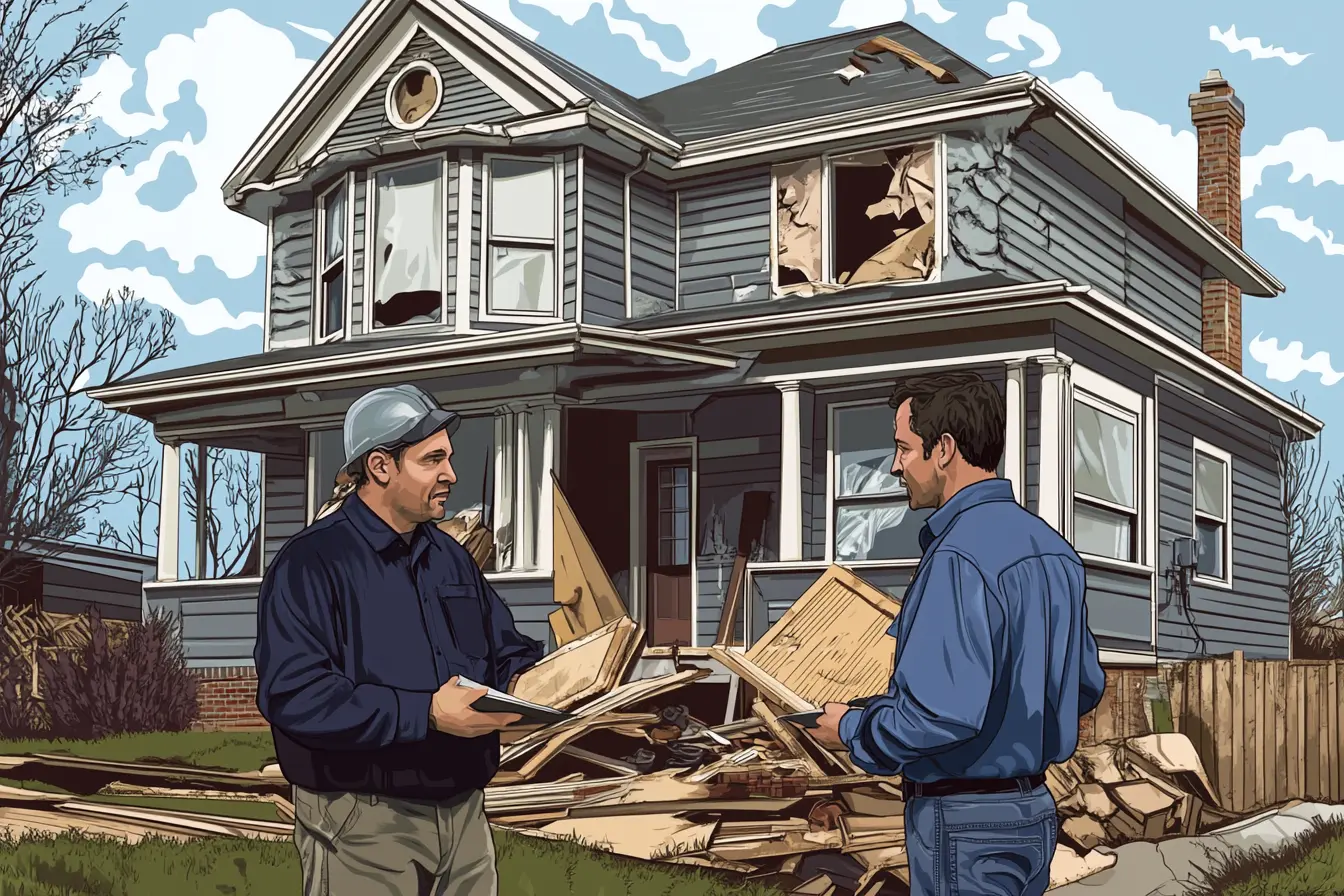Finding the Right General Contractor for Rebuilding or Repairing Your Home: A Comprehensive Guide

Rebuilding or repairing your home after a disaster is a significant undertaking that requires careful planning and execution. One of the most critical decisions you'll make is choosing the right general contractor (GC) to manage the project. A skilled and trustworthy contractor can ensure your home is rebuilt or repaired to high standards, on time, and within budget. Conversely, the wrong choice can lead to delays, cost overruns, and subpar workmanship.
This detailed article will guide you through the process of finding the right general contractor, including researching licensed contractors, evaluating insurance-approved contractors, seeking referrals, conducting interviews, checking references, comparing bids, and negotiating terms. We'll provide practical advice, specific examples, and relevant web links to help you make an informed decision.
1. Researching Licensed Contractors
Overview
The first step in finding a reliable general contractor is to ensure they are properly licensed and qualified to perform the work. A licensed contractor has met the necessary state or local requirements, including passing exams and maintaining insurance, which provides a level of assurance that they are competent and professional.
Steps to Research Licensed Contractors
Check State Licensing Boards: Most states have licensing boards that allow you to verify a contractor's license status online. These databases often provide information about the contractor’s license number, expiration date, and any disciplinary actions or complaints filed against them.
Verify Insurance Coverage: A licensed contractor should carry both general liability insurance and workers' compensation insurance. General liability insurance protects against property damage and injuries that occur on the job, while workers' compensation covers injuries to the contractor's employees.
Review Contractor Classification: Ensure that the contractor's license classification matches the type of work you need. For example, some contractors may be licensed for residential work but not for commercial projects, or they may specialize in specific trades like Plumbing or electrical work.
Example
Scenario: A homeowner in California needs to rebuild their home after a wildfire. They use the California Contractors State License Board (CSLB) website to verify the license of a potential general contractor. The website confirms that the contractor’s license is active, that they are covered by both general liability and workers’ compensation insurance, and that they have the appropriate classification for residential construction.
Further Reading
California Contractors State License Board (CSLB) License Check: CSLB License Check
2. Evaluating Insurance-Approved Contractors
Overview
After a disaster, your insurance company may provide a list of approved contractors to help you rebuild or repair your home. These contractors have typically gone through a vetting process by the insurance company, which can offer some peace of mind. However, there are pros and cons to using an insurance-approved contractor.

Pros of Insurance-Approved Contractors
Pre-Vetted: Insurance-approved contractors have generally been vetted by the insurance company, which may include background checks, licensing verification, and insurance coverage checks.
Streamlined Claims Process: Working with a contractor familiar with your insurance company’s processes can expedite the claims process, as they know how to submit paperwork and communicate with the insurer effectively.
Warranty Coverage: Some insurance-approved contractors offer warranties on their work, which can be an added layer of protection.
Cons of Insurance-Approved Contractors
Limited Choices: Relying solely on insurance-approved contractors may limit your options. You may find that the best contractor for your needs isn’t on the insurance company’s list.
Potential Conflicts of Interest: In some cases, insurance-approved contractors may prioritize the interests of the insurance company over those of the homeowner, particularly if there are disputes over the scope of work or costs.
Quality Concerns: While most insurance-approved contractors are reputable, there’s no guarantee that they are the best fit for your specific project. It’s important to conduct your own research and not rely solely on the insurance company’s recommendation.
Example
Scenario: A homeowner in Florida receives a list of insurance-approved contractors after a hurricane damages their home. They choose to interview a contractor from the list but also decide to get bids from other licensed contractors not on the list to compare options.
Further Reading
National Association of Insurance Commissioners (NAIC) - Home Insurance: NAIC Home Insurance
3. Seeking Referrals and Recommendations
Overview
One of the most effective ways to find a reliable general contractor is through referrals and recommendations from people you trust. Friends, family, neighbors, and colleagues who have recently completed similar projects can provide valuable insights into their experiences with contractors.
Steps to Obtain Referrals
Ask for Recommendations: Reach out to people in your network who have recently rebuilt or repaired their homes. Ask about the contractors they used, the quality of work, and whether they would hire the contractor again.
Check Online Reviews: In addition to personal referrals, check online platforms like Yelp, Angie’s List, HomeAdvisor, and the Better Business Bureau (BBB) for reviews and ratings. Look for patterns in the feedback, such as consistently positive or negative comments about specific aspects of the contractor's work.
Visit Completed Projects: If possible, visit homes where the contractor has completed similar projects. This allows you to see the quality of their work firsthand and ask the homeowner about their experience.
Example
Scenario: A homeowner in Texas asks their neighbor, who recently completed a major home renovation, for a contractor recommendation. The neighbor highly recommends the contractor, praising their attention to detail and timely completion. The homeowner then checks the contractor’s online reviews, which are overwhelmingly positive, and decides to reach out for a Bid.
Further Reading
Better Business Bureau (BBB) - Find a Contractor: BBB Contractor Search
4. Conducting Interviews
Overview
Interviewing potential general contractors is a crucial step in finding the right fit for your project. An interview allows you to assess the contractor’s communication skills, professionalism, and approach to managing your project.
Key Questions to Ask
Experience and Specialization: How many years have you been in business? Have you completed projects similar to mine? Do you specialize in disaster recovery or home repair projects?
Licensing and Insurance: Can you provide proof of your current license, insurance, and workers' compensation coverage? Are you familiar with local building codes and permit requirements?
Project Management: Who will be my primary point of contact during the project? How do you manage subcontractors and ensure quality control? How do you handle delays or unexpected issues?
References: Can you provide a list of recent clients as references? May I visit a current job site or see examples of your completed work?
Timeline and Budget: What is your estimated timeline for my project? How do you manage the budget and keep costs under control? What Payment Schedule do you propose?
Example
Scenario: A homeowner in New York interviews three general contractors for their home repair project. During the interviews, one contractor impresses the homeowner with detailed answers about their experience in post-disaster repairs, their approach to project management, and their plan for adhering to the budget. The homeowner checks the contractor’s references and visits a completed project before making a final decision.
5. Checking References
Overview
Checking references is a critical step in verifying a contractor's qualifications and reputation. Talking to past clients provides insight into the contractor’s reliability, work quality, and ability to handle challenges.

Steps to Check References
Contact References: Ask the contractor for a list of at least three recent clients. Contact these clients to ask about their experience, including the quality of work, adherence to timelines and budgets, and how the contractor handled any issues that arose.
Ask Specific Questions: When speaking with references, ask detailed questions, such as: Were you satisfied with the quality of the work? Was the project completed on time and within budget? How did the contractor handle any problems? Would you hire this contractor again?
Visit Job Sites: If possible, visit a current job site managed by the contractor. Observe the organization, cleanliness, and professionalism of the crew, and ask the client about their experience so far.
Example
Scenario: A homeowner in Colorado contacts three references provided by a general contractor. All three clients speak highly of the contractor, praising their communication skills, attention to detail, and ability to stay on schedule. Based on these positive references, the homeowner feels confident in hiring the contractor.
6. Getting Multiple Bids
Overview
Obtaining multiple bids is essential for ensuring you get a fair price and a comprehensive scope of work. Comparing bids from different contractors helps you understand the market rate for your project and identify any discrepancies in the proposed work.

Steps to Compare Bids
Request Detailed Bids: Ask each contractor to provide a detailed written bid that includes a breakdown of costs for labor, materials, permits, and any other expenses. The bid should also outline the scope of work, timeline, and payment schedule.
Compare Apples to Apples: Ensure that each bid includes the same scope of work so you can make a direct comparison. If one bid is significantly higher or lower than the others, ask the contractor to explain the difference. Look for things like the assumed cost per linear foot for cabinets, or the price of appliance packages because those items are largely out of a contractor’s control. For instance, they may be assuming too small a budget (to win the business) or too high a budget (to lock in higher quality items).
Watch for Red Flags: Be cautious of bids that seem too good to be true. A low bid may indicate that the contractor is cutting corners or using lower-quality materials. Conversely, a very high bid may include unnecessary costs.
Example
Scenario: A homeowner in Arizona receives three bids for their home repair project. Two of the bids are similar in price and scope, while the third is significantly lower. The homeowner asks the contractor with the lower bid to explain the discrepancy and learns that they plan to use less expensive materials. The homeowner decides to go with one of the higher bids, as they prefer higher-quality materials.
7. Negotiating the Contract
Overview
Once you’ve chosen a general contractor, it’s important to negotiate the terms of the contract to protect your interests. A well-written contract should clearly outline the scope of work, payment terms, timeline, and warranties.
Key Contract Elements
Scope of Work: Ensure the contract includes a detailed description of the work to be done, including materials, specifications, and any subcontractors involved.
Payment Schedule: Negotiate a payment schedule tied to specific milestones in the project. Avoid making large upfront payments, and ensure that the final payment is contingent on the completion of all work to your satisfaction.
Timeline and Penalties: The contract should include a timeline for completion, with penalties for delays caused by the contractor. This encourages the contractor to stay on schedule.
Change Orders: Specify how changes to the scope of work will be handled, including how costs and timelines will be adjusted. Keep in mind this conversation is just as much about how well the homeowner handles decisions as it is the contractor for understanding change impacts.
Warranties and Liens: Ensure the contract includes warranties on workmanship and materials. Also, require the contractor to provide lien waivers from subcontractors and suppliers to protect you from potential liens on your property.
Example
Scenario: A homeowner in Illinois negotiates a contract with their chosen general contractor. They agree on a payment schedule with progress payments tied to specific milestones, such as the completion of the Foundation and the installation of the roof. The contract also includes a clause for penalties if the project is delayed due to the contractor’s actions.
Further Reading
Federal Trade Commission (FTC) - Hiring a Contractor: FTC Contractor Guide
Angi’s List - How to Negotiate With Your Contractor
Wrap-Up
Finding the right general contractor is crucial for the success of your home rebuilding or repair project. By conducting thorough research, interviewing potential candidates, checking references, comparing bids, and negotiating a fair contract, you can ensure that your project is completed to the highest standards.